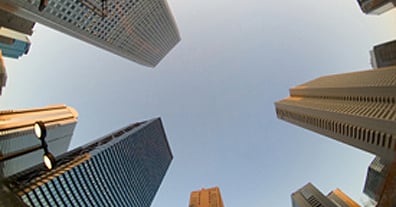Demand for these property classes has outstripped that of detached housing, according to the provincial real estate association

In the year that followed the B.C. government’s introduction of the foreign home buyers’ tax, consumer demand for condominium units and townhouses has significantly outpaced the hunger for free-standing homes, according to the B.C. Real Estate Association.
The MLS Home Price Index benchmark price of apartments has increased by 18.5 per cent compared to July 2016, up to $616,000. Meanwhile, the benchmark price for townhouses has grown by 11.9 per cent over the past year, up to $763,700.
BCREA economist Brendon Ogmundson attributed this shift to a pronounced need for more affordable residential real estate.
Jill Oudil, president of the region’s real estate board, backed this assertion.
“Detached home listings have increased every month this year, while the number of condominiums for sale has decreased each month since February,” Oudil told CBC News.
She added that the tax has failed to address the main factor igniting runaway housing costs in Vancouver.
“It most certainly hasn’t changed supply which has been our driving force in our market right now,” Oudil said.
The MLS Home Price Index benchmark price of apartments has increased by 18.5 per cent compared to July 2016, up to $616,000. Meanwhile, the benchmark price for townhouses has grown by 11.9 per cent over the past year, up to $763,700.
Andy Yan, director of SFU’s City Program, emphasized that curing the housing affordability malaise plaguing the city requires close coordination between the local, provincial, and federal governments.
“The expectation that this was about a single event, that it was about just foreign buyers by themselves creating unaffordability in the region, I think really fails to recognize the issue of a failing housing system,” Yan stated.
Related stories:
B.C. government to assess impact of foreign buyers’ tax
Demand for Vancouver luxury real estate reflects sustained Chinese attention
The MLS Home Price Index benchmark price of apartments has increased by 18.5 per cent compared to July 2016, up to $616,000. Meanwhile, the benchmark price for townhouses has grown by 11.9 per cent over the past year, up to $763,700.
BCREA economist Brendon Ogmundson attributed this shift to a pronounced need for more affordable residential real estate.
Jill Oudil, president of the region’s real estate board, backed this assertion.
“Detached home listings have increased every month this year, while the number of condominiums for sale has decreased each month since February,” Oudil told CBC News.
She added that the tax has failed to address the main factor igniting runaway housing costs in Vancouver.
“It most certainly hasn’t changed supply which has been our driving force in our market right now,” Oudil said.
The MLS Home Price Index benchmark price of apartments has increased by 18.5 per cent compared to July 2016, up to $616,000. Meanwhile, the benchmark price for townhouses has grown by 11.9 per cent over the past year, up to $763,700.
Andy Yan, director of SFU’s City Program, emphasized that curing the housing affordability malaise plaguing the city requires close coordination between the local, provincial, and federal governments.
“The expectation that this was about a single event, that it was about just foreign buyers by themselves creating unaffordability in the region, I think really fails to recognize the issue of a failing housing system,” Yan stated.
Related stories:
B.C. government to assess impact of foreign buyers’ tax
Demand for Vancouver luxury real estate reflects sustained Chinese attention



